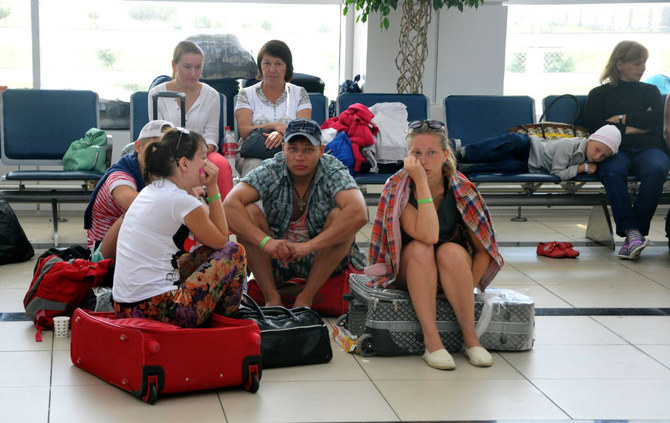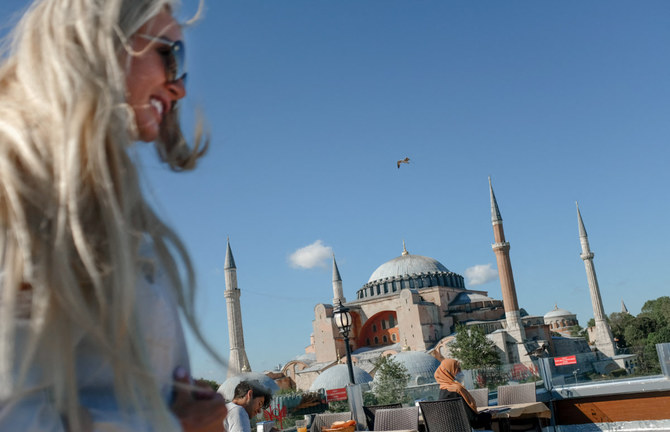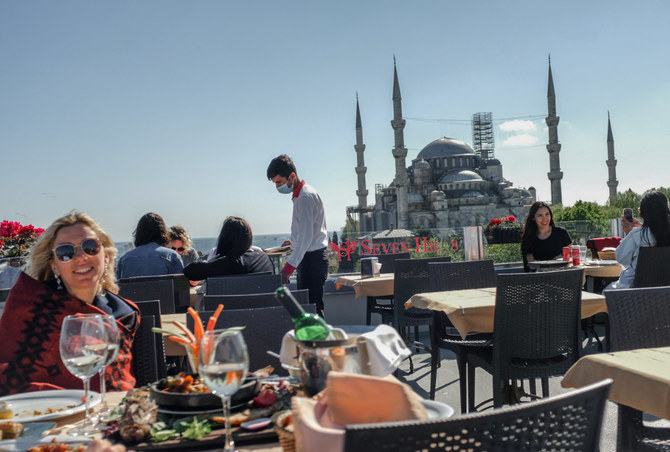DUBAI: From his office in downtown Moscow, Vladimir Inyakin, founder of the local travel agency All World, is helping people in search of a ticket to fly out of Russia.
Since the Ukraine invasion began on Feb. 24, prompting Western nations to bar Russian passenger jets from their airspace, the Russian travel industry’s business model has undergone a rapid makeover.
Where once Inyakin helped his clients to book luxury getaways around the globe, he now helps them to reach any destination that provides respite from the prevailing atmosphere of crisis, conflict and international isolation.
“Russians were initially scared, panicking, crying and ready to pay any money to leave the country,” Inyakin, who established his travel agency in 2008, told Arab News. But now, nearly two months into the Ukraine war, some Russians are thinking of traveling again and Inyakin is on hand to arrange their itineraries.

Of course, Western sanctions have greatly shrunk the list of places Russians can travel to without a lot of hassle. Bermuda, which has suspended certification for Russian-operated planes registered there, is one extreme. On the other extreme are countries that have long benefited from Russian tourism and remain open to visitors from Russia.
“Many places are afraid to lose Russian clients,” said Inyakin. “We can now only fly to 15 countries, mostly ex-USSR countries, as well as Iran, Israel, Turkey, Vietnam, Zanzibar, Qatar, the UAE and Thailand with some Russian airlines.”
“They are traveling anywhere they can with a one-way ticket and cash — Uzbekistan, Georgia, Armenia, the UAE, for example,” said Inyakin. “If you fly abroad, you must take cash with you. Those that can afford it are going to Dubai.”
When the value of the Russian ruble plummeted at the outset of the war, Russian savers rushed to convert their earnings into other more stable currencies or to place them into secure accounts and investments abroad.
But, in a surprising reversal of fortune, the ruble has steadily rebounded, its value now double of what it was on March 7. On April 8 the ruble rallied past 72 to the dollar although it has since shed some of its gains.
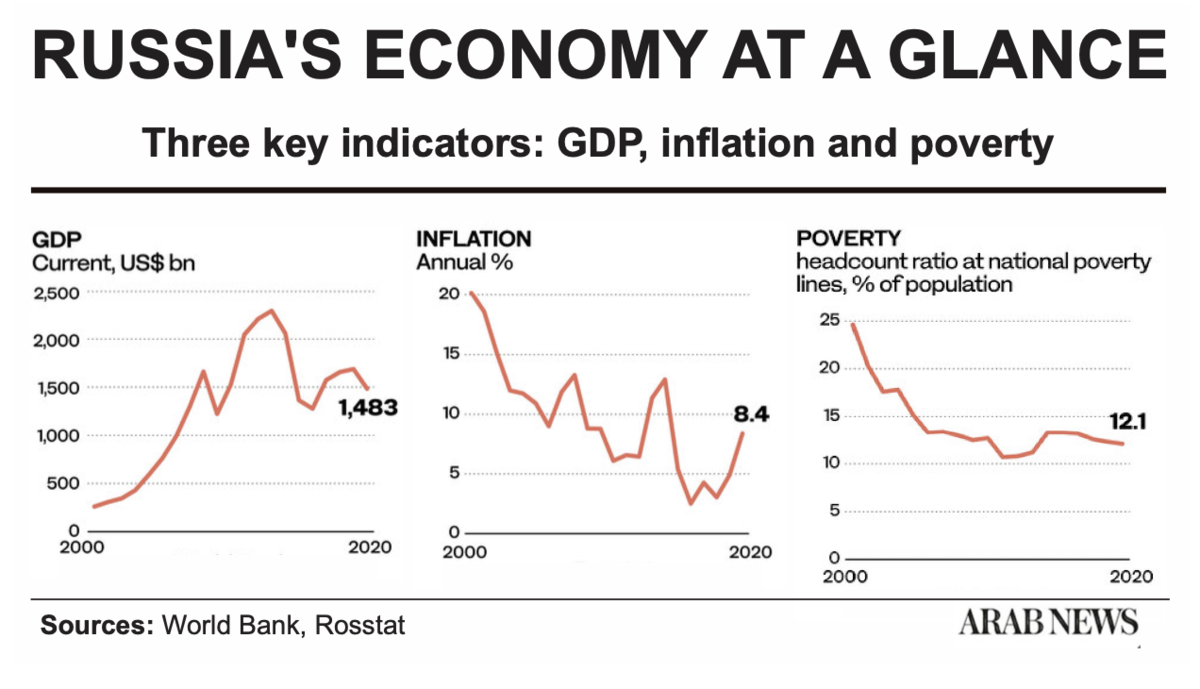
A Reuters report said the ruble’s weakening is driven by expectations that Russia may relax its temporary control measures further, easing requirements for mandatory foreign currency revenue sales by export-focused companies.
Jet fuel prices have risen dramatically since Western sanctions hit Russia’s hydrocarbon-based economy, pushing up airline-ticket prices across the board. Nonstop roundtrip tickets from Moscow to Dubai range from $609 on flydubai, $1,359 on Emirates and $810 on Turkish Airlines—several hundred dollars higher than pre-February 24 prices.
Before the war, says Inyakin, “you could fly round-trip from Moscow to Dubai with Aeroflot for $300-350.” Aeroflot has yet to resume operations.
“There’s inflation now and the exchange rate — dollar into Russian ruble — is extremely high,” one Russian citizen living in the Gulf told Arab News on condition of anonymity.
When SWIFT, the messaging service that connects more than 11,000 financial institutions around the world, suspended services for seven Russian banks at the end of February in response to the war, it crippled the country’s financial system and curtailed its ability to trade globally.
In practical terms, the suspension made it near impossible for Russians to use their credit cards and bank accounts abroad.
“The main challenge now for Russians wishing to travel is that if you are a Russian citizen living in Russia, you cannot easily book airline tickets or hotels since Visa and Mastercard are no longer supported in Russia,” the Gulf resident said. “Very few countries are accepting Mir, the Russian national payment system.”
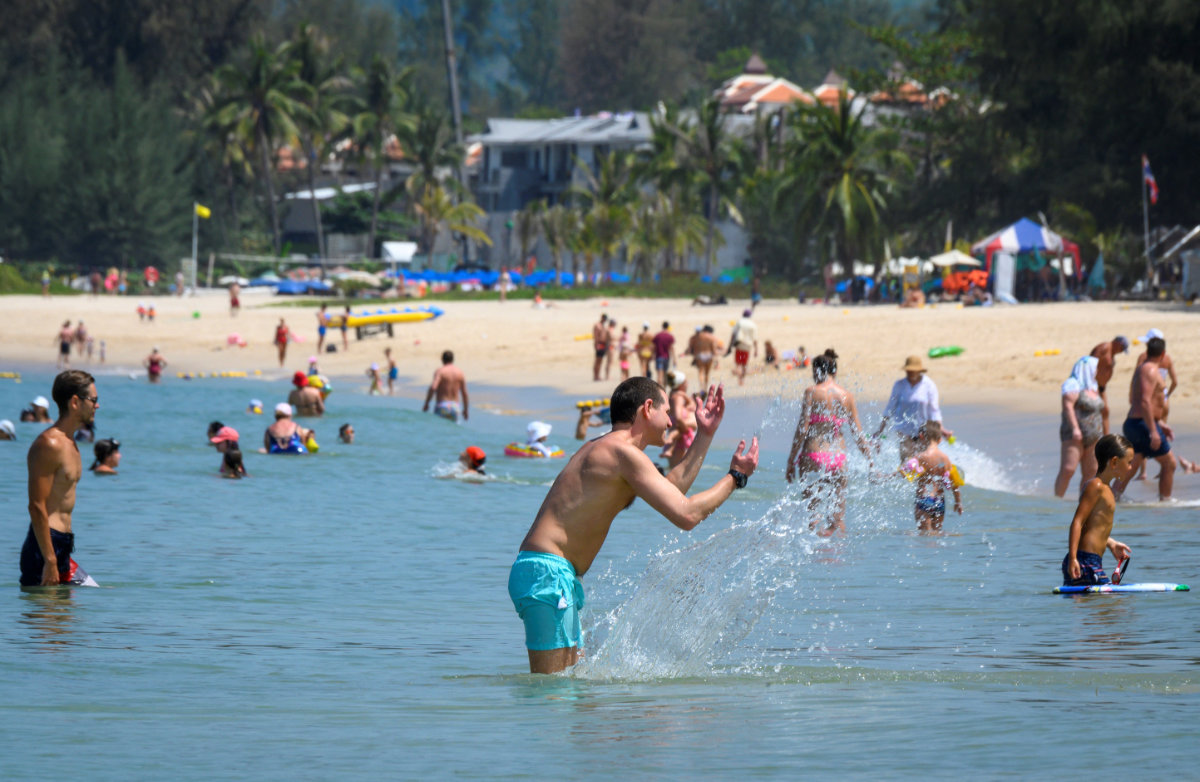
Russians have been vital for the tourism industry’s recovery. (AFP)
The drop in the number of Russians traveling abroad is already having a damaging impact on at least five tourist hubs once popular with Russian and Ukrainian visitors: Thailand, Vietnam, Turkey, Egypt and Cyprus.
The leisure and hospitality industries in these countries can ill afford such disruption, especially in the wake of lockdowns and travel bans imposed during the COVID-19 pandemic that decimated global tourism in 2020 and 2021.
Sanctions and boycotts imposed in response to the war are also harming Russia’s own tourism industry. Russian tour operators banking on the post-pandemic recovery will be sorely disappointed.

Russians have been vital for the tourism industry’s recovery. (AFP)
Prior to the war, Ukrainians too were avid travelers. But now, with millions of them displaced by the fighting, their spending, like that of Russians, has vanished from the international tourism market.
“As Ukrainians we usually love to travel,” Mariia, a Ukrainian originally from Odessa now living in Dubai, told Arab News. “Tourism is not even on our minds right now.”
For millions of men still in Ukraine, travel is simply not an option. Those aged 18 to 60, like Mariia’s father and brother, are of conscription age. “They could be called into the service at any time,” she said.
With its historic cities, verdant countryside and picturesque coastline, Ukraine was a popular tourist destination in its own right. Now its airspace is closed to passenger jets while its towns and infrastructure lie in ruins.
“I never in my life thought I would hear the air raid sirens over a video call in my city,” Mariia said. “I didn’t even know we had one. It’s been so devastating.”
One nation that will feel the loss of Russian and Ukrainian visitors perhaps most of all is Turkey. The luxury hotels, marinas and shimmering beaches of Bodrum and Antalya have long been a playground of Eastern European tourists.
Before the pandemic, tourism made up 10 percent of Turkey’s gross domestic product. In 2021, after the lifting of COVID-19 travel restrictions, about 4.7 million Russians and 2.1 million Ukrainians visited the country — accounting for a quarter of its 24.7 million foreign visitors that year.
The Association of Turkish Travel Agencies had expected 7 million Russians and 2.5 million Ukrainians to visit this year, and the industry to post $35 billion in revenues.
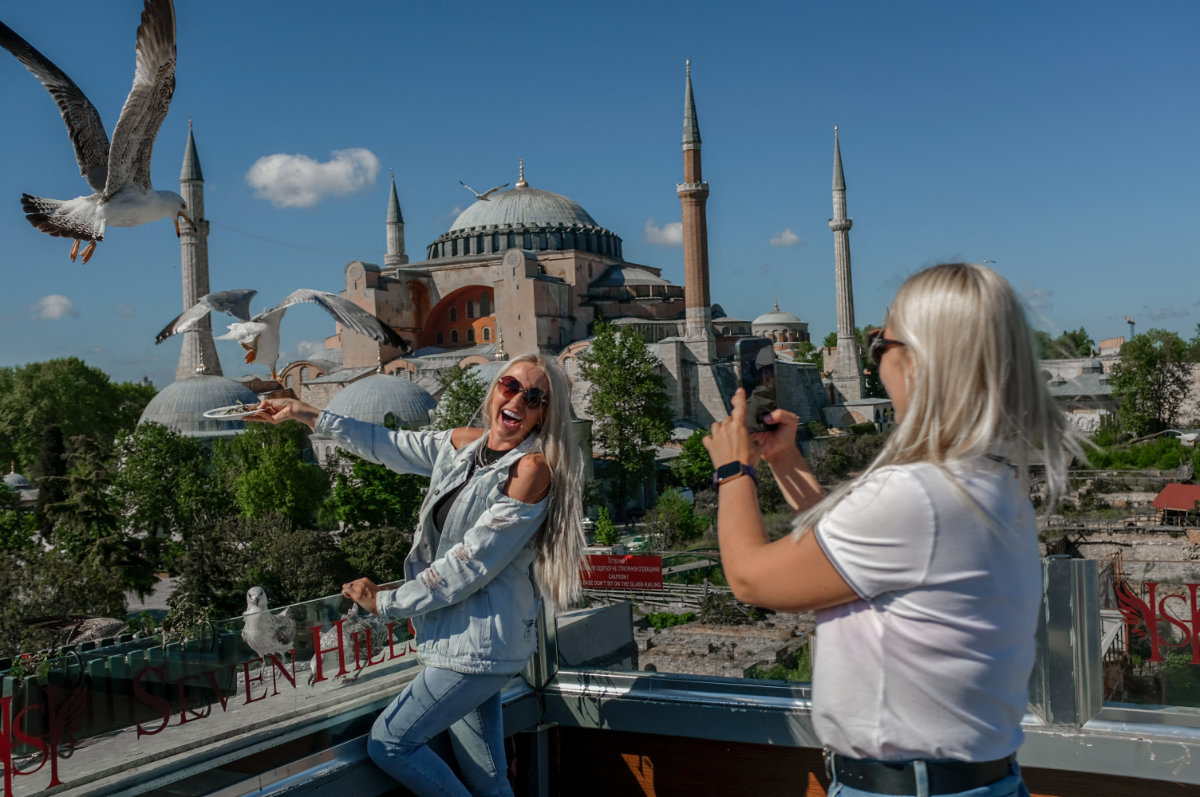
A Ukrainian tourist poses for a picture near the Hagia Sophia Mosque at Sultanahmet in Istanbul, Turkey, on May 9, 2021. (AFP file photo)
Although Turkey has not sanctioned Russia nor closed its airspace to Russian airlines, the invasion of Ukraine has dashed hopes of a post-pandemic recovery.
Vietnam has likewise revised down its estimates for the coming year. The province of Khanh Hoa and the island of Phu Quoc had long been popular among Russian tourists, as had the city of Phan Thiet, affectionately known as “Little Moscow.”
According to one survey by Vietnam’s National Administration of Tourism in 2019, Russians spent an average of $1,600 per stay compared to the average foreign visitor who spent around $900.
Several Vietnamese travel agencies catering solely for Russian visitors have sprung up over the years. But, on March 23 this year, in response to the war, Vietnam Airlines announced it was suspending flights to and from Russia.
Similar scenes are playing out in Thailand. On March 25, the South China Morning Post reported that more than 7,000 Russian tourists were stranded in the country’s once popular holiday destinations.

A picture taken on September 29, 2021 shows Russian tourists in the Egyptian Red Sea resort of Sharm el-Sheikh. (AFP file)
Looking on the bright side, in recent weeks many stranded Russians have been successfully repatriated. The state-owned news agency TASS, citing the Russian Federal Agency for Tourism, said that more than 85,000 Russian tourists were repatriated in March. The report said that Egypt had the largest number of package tourists, around 4,000.
The repatriation process, however, has been complicated by new Western sanctions targeting the aircraft that are expected to be used for special flights from Egypt to Russia. Tour operators are having to use different routes to fly stranded Russian tourists through third countries such as the UAE, Turkey, the Maldives and Thailand.
“The war in Ukraine poses new challenges to the global economic environment and risks hampering the return of confidence in global travel,” the UN World Tourism Organization said in a statement on March 31.
“The shutdown of Ukrainian and Russian airspace, as well as the ban on Russian carriers by many European countries, is affecting intra-European travel. It is also causing detours in long-haul flights between Europe and East Asia, which translates into longer flights and higher costs.

“Russia and Ukraine accounted for a combined 3 percent of global spending on international tourism in 2020 and at least $14 billion in global tourism receipts could be lost if the conflict is prolonged.”
In Italy, where tourists are only just returning after two years of pandemic restrictions, the absence of Ukrainian and Russian tourists is palpable. The country has joined other EU members in imposing sanctions on Russia and has stopped dealings with Russian banks.
A report in the UK’s The Guardian says that while Russians hardly constituted the top 20 for numbers of visitors to Italy, in terms of time spent in the country they were ninth, and when measured by overall economic impact they were second, behind only Germany.
“Traditionally the average Russian visitor stayed in Italy for five or more days, compared to two or three from most other countries, and they spent around 65 percent more money per day than the average tourist,” Costabile said. “I assure you, the absence of Russian visitors in the sector will be felt.”
One place where Russians are still welcome is Dubai. Long a popular tourism destination for both Russians and Ukrainians, the UAE’s commercial capital continues to be warm and welcoming for those with the financial means.

Dubai has long been a popular destination for both Russians and Ukrainians. (Shutterstock)
“Due to these challenging times for Russia now under sanctions, more Russians are looking to move to Dubai than ever before,” Anastasia, a Russian art consultant who arrived in Dubai two months ago, told Arab News.
Others are wary about the future, unsure where to go, whether to stay, or how to sustain themselves in the short term.
“Everything is still so unclear,” a Russian expat who lives in the Gulf told Arab News on condition of anonymity. “No one knows how long this war will last and what more will be affected. You don’t know how to calculate the risks.”
The embassy of Ukraine in the UAE recently announced that Ukrainian tourists who arrived in the Gulf country before the war may apply for a one-year residency visa.
As for the more than 1,000 Ukrainians who found themselves stranded in Dubai when the invasion began in February, aid agencies stepped in to house them or arrange tickets to Poland, where millions of war-displaced Ukrainians have found refuge.
“Traveling is not something on their mind now,” one Ukrainian living in Dubai told Arab News on condition of anonymity, describing their own family’s circumstances.
“There are no flights to or from Ukraine. People who managed to escape early on are largely those who could afford it and then came to places like Dubai.”
With a peace deal still eluding Russian and Ukrainian negotiators and the battlefront now shifting to the disputed east of the country, there is little sign of a return to business as usual any time soon.


